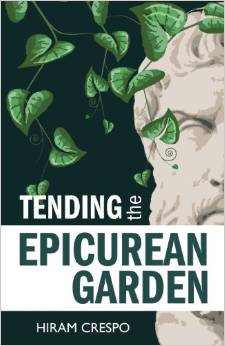Hiram Crespo’s “Tending the Epicurean Garden”
I have been meaning to write a more extended review of this new book, but I don’t want to wait any longer to post about it. Hiram’s recently-released “Tending the Epicurean Garden” is excellent, and it is focused on providing practical advice as to how to apply ancient Epicurean principles to live a happier life in the modern world.
As most readers of this blog know, Hiram Crespo is the founder of the Society of Epicurus (www.SocietyofEpicurus.com). This is his first book, and it explains the suggestions he has developed after studying the philosophy of Epicurus for living according to its principles.
“Tending the Epicurean Garden” is not an academic treatise or a primer on basic Epicurean doctrines. Rather it is a practical guide written for general audiences. The book explains Epicurean views and provides context for comparison with similar views from numerous other traditions, and shows how techniques from a variety of sources can be combined to assist in living more happily.
The book is well written and well organized, and provides what is essentially a “self-help” approach with much specific advice.
This is one of the few unabashedly pro-Epicurean books written in the last several hundred years. As far as I know, one has to go back to Frances Wright’s “A Few Days In Athens” for another book which comes out swinging and without reserve advocates Epicureanism as a lifestyle and as a philosophy.
This book can be read and understood by anyone with any degree of knowledge about the history and doctrine of Epicurus, because the author provides a good measure of both in the course of the book.
Readers who are new to Epicureanism, however, would profit from reviewing the ancient texts by consulting websites such as www.Epicurus.info, www.Epicurus.net, and of course Crespo’s own www.SocietyofEpicurus.com for more background. The biography of Epicurus by Diogenes Laertius is easily readable, and it proves most of the basic raw material from which all modern knowledge of Epicurus is drawn. Combine that with a review of Lucretius’ De Rerum Natura and you have most of the important background from which “Tending the Epicurean Garden” is drawn.
Crespo has been working with the Society of Epicurus project for several years now, and judging from his activity level we can hope for much more from the same author. He writes fluently in Spanish as well (so I understand!) so this puts him in a unique position to communicate Epicurean views to an audience that has had to rely mostly on texts in other languages. “Tending the Epicurean Garden” is a great start and I highly recommend it.

